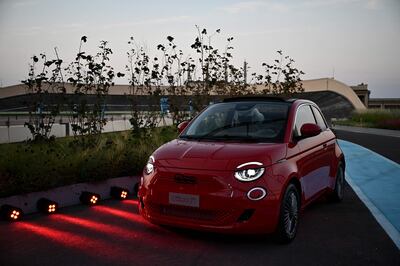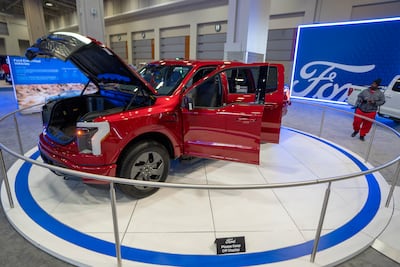Global car makers are in a race to electrify their vehicles as they press forwards with strategies to drive the next phase of mobility.
This means billions of dollars in investment, apart from the creation of new jobs, pledges to meet sustainability goals and several new vehicle models that are being introduced in an effort to make the shift to the next generation of transport faster.
“Recent years have seen exponential growth in the sale of electric vehicles, together with improved range, wider model availability and increased performance,” the International Energy Agency said.
“However, electric vehicles are not yet a global phenomenon. Sales in developing and emerging countries have been slow due to higher purchase costs and a lack of charging infrastructure availability.”
The global EV market continues to grow amid a government and societal shift towards energy conservation, with car makers' consumer and commercial divisions tapping into the technology's potential.
A number of governments are also offering incentives to convince their residents to adopt EVs.
It is expected that EVs will account for half of global car sales by 2035 and hit about 73 million units by 2040, from 2 million in 2020, a study by Goldman Sachs showed. During this time, the percentage of EVs in global car sales is projected to rise to 61 per cent, from 2 per cent.
The sector's market value is projected to hit more than $1.1 trillion by 2023, from about $209 billion in 2022, at a compound annual growth rate of more than 23 per cent, according to the latest data from Precedence Research.
We take a look at what some of the top car makers worldwide are doing.
General Motors: Everyone needs an EV

General Motors, the largest car maker in the US, has pledged to invest $35 billion in product development spending for EVs, and self-driving vehicles as well, which would exceed the Detroit-based company's investments in gas and diesel, according to its website.
“Climate change is real, and we want to be part of the solution by putting everyone in an electric vehicle,” GM chief executive Mary Barra said.
The Chevrolet Bolt, arguably GM's most popular EV, starts at $26,500, while the Hummer Edition 1 — which GM touts as the world's “first all-electric super truck” — starts at $108,700.
Volkswagen: Creating a 'Buzz'

Volkswagen, Europe's biggest car manufacturer, plans to build about 1.5 million EVs a year by 2025, part of its strategy of becoming a carbon-neutral business by 2050, according to its website.
The German company has invested more than $3.5 billion in its EV operations in Chattanooga, Tennessee, positioning itself to become North America’s EV test centre, it said.
“There may be no way to combat global warming without millions of electric vehicles worldwide,” it said.
Volkswagen has the ID.4 EV, which starts at $38,995. Its next EV, the ID. Buzz, which is expected to be introduced this year and made available for sale in 2024, has a reported starting price of about $60,000.
Stellantis: 100% EVs in Europe by 2030

Stellantis, the company formed in 2021 by a merger between Fiat Chrysler Automobiles and French PSA Group, said it is in “full execution mode” with its electrification strategy, offering “advanced technology at affordable prices”, according to its website.
The company, which also owns the Dodge, Jeep, Opel and Peugeot brands, intends to have EVs make up 100 per cent of sales in Europe and 50 per cent in the US by the end of the decade, offering more than 75 models and reach global annual battery EV sales of five million units by 2030, it said.
“This shift is being driven, in part, by our customers with eco-consciousness being the fastest-growing trend around the world and across generations over the last five years,” Stellantis said.
Among its most popular EVs are the Peugeot e208 Allure, which starts at about $44,000, the New Fiat 500, beginning at $34,000, and the Jeep Wrangler 4xe, starting at about $55,000.
Ford: Building resources

Ford, the second-biggest US car maker, is investing $22 billion through to 2025 as part of its electrification programme, including $700 million at its Rouge Centre in Michigan to build an all-new F-150 pick-up line, the company said on its website.
Including investments for its Bronco and Ranger models at its assembly plant in Wayne, the company aims to invest more than $1.45 billion and create about 3,000 jobs over the next three years in Michigan alone, it said.
In addition, Ford has invested $500 million in electric car start-up Rivian, and it will also use VW’s Modular Electric Drive architecture to develop a new EV for the European market starting this year, it said.
Ford's Mustang Mach-E starts at $46,000 while the F-150 Lightning begins at $56,000. The company also pledges that the vehicles will be able to travel some of the longest or “top US road trips” on a single charge.
Toyota: Catching up

Toyota, the world's biggest car maker, has been criticised for its perceived lack of speed in developing EVs, despite being the first to introduce the first mainstream hybrid vehicle, the Prius, in 1997.
The Japanese company announced plans to sell 3.5 million EVs annually across 30 models from its Toyota and Lexus brands by 2030, as well as the development of more cars along the way.
This will be done through an investment of about $70 billion globally from 2022 through to 2030, its president Akio Toyoda had said.
Toyota's current EV on offer, the bZ4X sport utility vehicle, starts at $42,000.
Tesla: Still in the driver's seat

Tesla, the world's biggest electric vehicle manufacturer, set another record for annual deliveries as it shipped 1.31 million cars in 2022, up more than 40 per cent a year, it reported last month.
The jump in deliveries was buoyed by a record fourth quarter, despite production challenges and concerns about weakening demand.
Tesla also cut prices in Asia and the US last month to address demand concerns and boost sales. However, it did raise Model Y prices in the US shortly after Washington eased out terms on EV tax credits.
“We continued to transition towards a more even regional mix of vehicle builds, which again led to a further increase in cars in transit at the end of the quarter,” Texas-based Tesla said.
Based on US prices, Tesla's Model 3 is its cheapest EV, starting at $43,000. The company is also ramping up its product line with the Cybertruck and the heavy-duty Semi.


